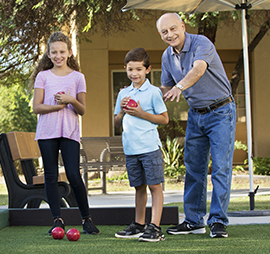You may have read or seen in the news lately that long-term nursing care centers have begun combining forces with daycare centers due to the observed benefits of multi-generational relationships. However, these benefits are now thought to extend further for retired adults, to encompass sharing activities and friendships with children, young teenagers and college students.
A multi-generational relationship is one that combines people on opposite ends of the aging spectrum – typically between kids or teenagers and adults who are retired. It can serve as a type of mentorship or friendship, as many adults reported they ended up referring to the child or children as their “adopted” grandchild.
While these relationships can be built between grandparents and their grandchildren, they can also be forged through community programs with non-familial connections. More retirement communities and nursing care programs are combining outings and activities to develop meaningful connections with children and teenagers in their community.
This article will explain some of the benefits of multi-generational relationships which researchers have identified for retired adults and children alike.
How has this worked in the past?
The notion of mixing childcare with retirement communities originated in Japan in the 1970s. Since then, the concept has spread across the United States, Canada, the Netherlands and the United Kingdom among many other countries, all of which have reported significant benefits, both for the children and the adults who work to make an active impact in their lives.
Here are four reasons you should spend time with kids:
1. Good for you
Entering retirement can bring about many unknowns, including what to do with all of the time you now have that was once spent on your career and raising your family. Spend time picking up hobbies, visiting with family and volunteering. Forging multi-generational relationships with kids in your family or in your community can provide the most meaningful impacts for both you and the kids.
When older adults spend more time with kids and teenagers, they can experience the following benefits:
- Gives you the freedom to let loose, have fun and be creative as you try new activities.
- Improves your perception of pain, physical health and overall life satisfaction while fulfilling a need for social fulfillment.
- Extends a sense of purpose and fulfillment that you’re giving back and encouraging future generations.
- Reduces a sense of loneliness, isolation and depression and provides an outlet for mentorship and friendship with those outside of your retirement community.
- Increases mobility which can reduce fall risks as you play with children, engaging the muscles and neurological balance components needed to prevent falls in the future.
2. Good for kids
Research into early childhood development states that young children need at least four to six actively involved adults in their lives in order to fully develop both emotionally and socially. However, for kids who have different family backgrounds or who may grow up without a parent or set of grandparents in their lives, that may be difficult. In the era of technology, kids are spending more time on their computers and cell phones and less time socializing with older adults, which can be detrimental to their overall development.
Researchers state that children who have older adults in their lives experience the following benefits:
- Increases confidence, self-esteem and life skills.
- Provides a positive role model.
- Sharpens literacy and communication skills.
- Fulfills a need of undivided attention from a busy or overburdened parent.
- Promotes new ideas, hobbies and ways of thinking about the world around them, prompting new academic interests and even helping them to achieve better grades in school.
- Encourages problem-solving, as older adults have more experience in that and emotional intelligence, which can in turn influence the way that children navigate normal life challenges with guidance and advice.
3. Grow mutually from a mentor-mentee relationship
Gaining a mentor can make a huge difference in a child or teenager’s life. For some kids, gaining access to a mentor who can serve as a teacher, friend, confidante or all three can help make a needed difference in their future. Studies have shown that teenagers are less likely to abuse alcohol and drugs later in life when exposed to a mentor-mentee relationship throughout those key developmental years. Learning about the examples you experienced in your lifetime can show them that you can still be successful and happy regardless of certain barriers in life.
4. Gives you a new perspective on life
Spending time with kids can have impactful benefits that can change the way you look at life. With younger kids who have that notorious “childlike sense of wonder,” you might feel propelled back into your youth, helping you keep a positive mood and a hope for the future generations to come. Being exposed to kids and teenagers can also keep you current on what’s going on in the world, including the ever-changing world of technology and media.
How can you expose yourself to multi-generational relationships?
Starting a multi-generational relationship can be as easy as spending time with the children in your family or reaching out to a local organization that offers mentorship and volunteer programs with kids in your community.
Multi-generational relationships are one aspect of a happy, healthy retirement. For more information on how you can live your retirement to the fullest in the home you love, explore the Sun Health At Home program. With the support of a personal Wellness Coordinator, you’ll have more time to spend on the things that matter to you—like giving back to the community through mentoring a young person or spending more time with family.

